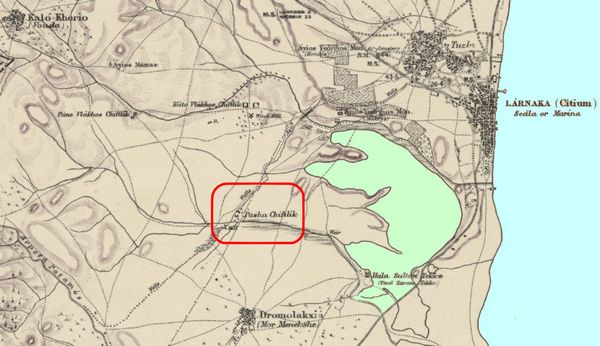The Arrival of the British
On the 22nd July 1878, HMS Himalaya carrying Sir Garnet Wolseley arrived in Larnaca at around 7:30am after a "calm pleasant voyage passing all the transports carrying troops."

A view from the anchorage and the landing stage at Larnaca - click the image or this link for a larger version (opens in a new window)
On arrival, troops marched to a camp called Chiflik Pasha close to the Salt Lake near Larnaca.
They were totally unprepared for the July heatwave and on the first day Sgt Samuel McGaw VC of the' 42nd Highlanders: The Black Watch' died of heat exhaustion during the march to the camp.

The location of the Chiflik Pasha camp - note the reversal of words in this '1882 Kitchener's Survey of Cyprus' map (coloured for clarity)
The camp is no longer marked on this map indicating that it was abandoned before the survey
Click the image or this link for a larger view (in a new window)
His death was an ill-omen. Heat, fever and illness would claim many in the years to come.
The 71st (Highland) Light Infantry left Malta and disembarked at Larnaca on the 24th July 1878 - and like the earlier troops, they would have marched to Chiflik Pasha camp.
Sir Garnet Wolseley wasn't impressed with Larnaca which he describes as, "a pesthouse of dirt and fever. I never saw a filthier spot."

A Bazaar in a Larnaca street
A description of the conditions in the Chiflik Pasha camp makes very uncomfortable reading.
"The camp was at a place called 'Chiflik Pasha’, the very hottest spot that could possibly have been selected. For miles around there was not a tree or a shrub of the height of a foot and the blazing sun penetrated through the thin canvas of the single bell tents, as if mocking the puny efforts of men to protect themselves from its fierceness.
Though giving every encouragement to the sun, they carefully excluded all passage of air to lessen the torture of the poor men who lay all day gasping in the intolerable heat. The nights were cold and chilly in comparison to the day heat; and for three months the soldiers, having no matresses, were forced to sleep on the bare ground, with only a blanket to cover them."